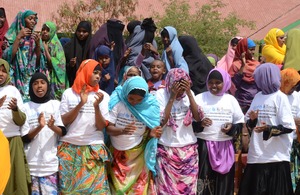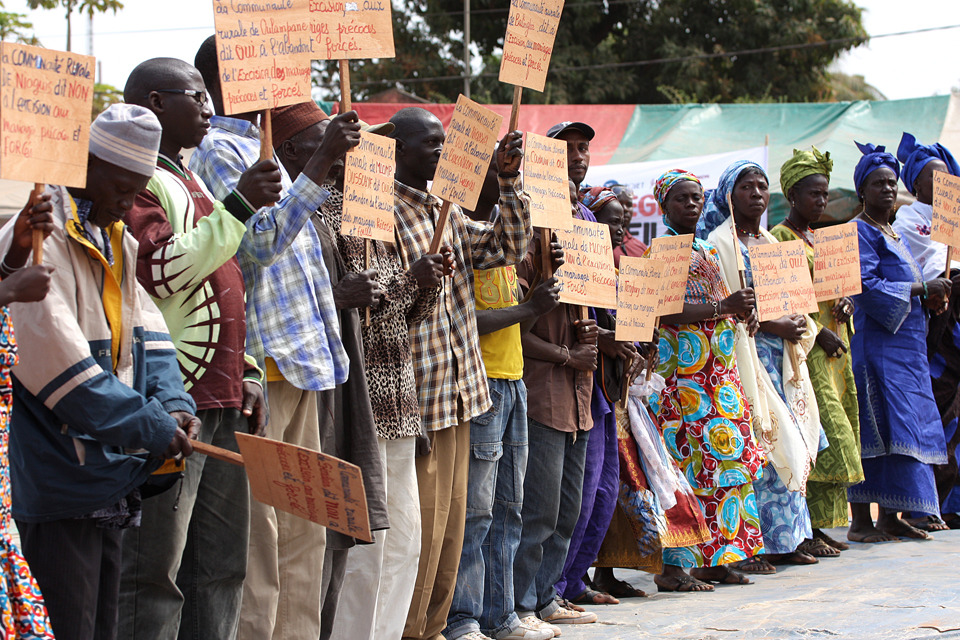A time for change: ending female genital mutilation
UK aid backs global wave of change to end damaging practice within a generation

A group of girls clapping at a public declaration for the abandonment of female genital cutting (FGC) in Ziguinchor, Senegal. Picture: Tostan International
While women’s rights across Africa have made great progress, there remains a two thousand year old practice that undermines a woman and girls right to choose how they live their life in some communities. This practice is called Female Genital Mutilation (FGM), sometimes known as cutting (FGC), and it is where women and girls, including newborns in some cultures, have partial or total removal of the external female genitalia for non-medical reasons.
The 6th of February marks the International Day of Zero Tolerance towards Female Genital Cutting, and it has never been so important that the fight to ban this extremely damaging practice causing severe physical, psychological and emotional pain is won. It is estimated that up to 140 million women and girls have been subjected to FGM/C around the world, but it is in Africa where 95% of all cases of this practice are most reported.
In March 2013 the UK announced the biggest ever international investment in eradicating FGM. The new programme will work to reduce FGM by 30% in at least 10 countries over the next 5 years.
Online discussion on how to end FGM/C in a generation
On 6 February 2013 we marked the International Day of Zero Tolerance for Female Genital Mutilation with a Google+ Hangout. The United Nations Population Fund (UNFPA), UNICEF, the UK Department for International Development (DFID) as well as representatives from Senegal, Egypt and Kenya discussed live how to end female genital cutting in a generation.
Over 10,000 communities have declared their abandonment of FGM/C. What will it take to make it 100,000?
The Google+ Hangout brought together UK International Development Minister and Champion for the elimination of violence against women, Lynne Featherstone, Dr. Babatunde Osotimehin, Executive Director of UNFPA; Dr. Attef El Shittany, Rapporteur of the National Population Council, Egypt; Molly Melching, Founder and Executive Director of Tostan and Janet Tumer, Young Il Shamus activist from Kenya.
Continue the conversation via Twitter using #endFGM or post comments to our Google+ page.
The push for change

A group of men and women hold up signs at a public declaration for the abandonment of female genital cutting (FGC) in Ziguinchor, Senegal. Picture: Tostan International
This year alone, 3 million girls in Africa are at risk of undergoing FGM/C. African nations have shown great leadership in tackling this issue. Since 2010, countries such as Senegal, Uganda and Burkina Faso have thrown their support behind a proposed UN resolution banning FGM/C, and in December 2012 this resolution was passed, signalling the start of the fight to eradicate this damaging practice from the entire world.
FGM/C has been proven to have devastating impact on women’s and girl’s emotional, physical, and mental health and well-being. It also limits their opportunities in life as it affects their education, their ability to participate in politics, and makes them less likely to be able to go out and work, meaning they depend on others.
With the push for change coming from within Africa, the UK government is scaling up its support to end this highly damaging practice. UK aid will work with partners to build support at local, national and international levels, with a focus on community level interventions in Africa to lead to the abandonment of FGM/C.
Now that there is clear momentum from African countries to stopping FGM/C, the time is right to act. We want to see the international community step up and commit resources to ending this practice, in line with the United Nations General Assembly resolution.
Voices from the field
UK aid is supporting an Amnesty International human rights education project to promote female empowerment in order to combat harmful traditional practices like FGM/C in Burkina Faso, Mali and Senegal. Talking openly in communities about this deeply embedded cultural practice is helping to overcome the taboos associated with it.
When men and women, elders and leaders in communities come together to tackle old perceptions, change is possible. It is important that women feel they are supported when they say no to FGC without being shunned by their community. Without communities abandoning FGC practices, it is highly likely to continue, hindering not just the progress of women and girls but of a country as a whole.
In Burkina Faso, group discussions and education within communities have helped significantly to break down misconceptions. Traditional leaders and women’s leaders at Pabré, a community located 20 kms from Ouagadougou, and known to be the epicentre of FGM/C in Burkina Faso, set up 22 “Alert units”. These “Alert Units” aim to inform the police of any attempt to practice FGM/C in these villages. This clearly demonstrates that FGM/C is seen as a crime and those who partake in it will held accountable.
In another project in Kalaban Coro, in south-western Mali, midwife Touré Sira Doumbia, says, “We know lots of consequences of FGM/C and we have conducted many sensitization activities around this issue. The first ones have been performed in health centers directed to pregnant women, among whom many went through serious complications during their first delivery.”
Stats and facts
Over 95% of all FGC is in Africa. 3 million girls a year in Africa are at risk of undergoing female genital mutilation/cutting. Between 100 million and 140 million women in the world today have been subjected to FGM/C.
98% of women in Somalia aged 15-49 years have been subjected to FGM/C.
FGM/C involves partial or total removal of the external female genitalia. It has no health benefits. In its most extreme form the external genitalia are cut out and the girl’s vagina sewn up. It will then be cut open on her wedding night and opened and closed for each birth. The cutting causes severe physical and psychological damage and pain, which can include painful menstruation and accumulation of menstrual blood in the vagina, problems urinating, long-term disability and severe problems in pregnancy and childbirth, with negative impacts on girls and women’s education and wider opportunities.
FGM/C has severe physiological impacts, including fear of sexual intercourse, impact on relationships, post-traumatic stress disorder, depression and anxiety.
It is likely that FGM/C has a significant impact on girl’s and women’s education, political participation, economic opportunities.